This article was co-authored by Alina Lane, DDS. Dr. Alina Lane is a Dentist who runs All Smiles Dentistry, a general practice dental office based in New York City. After completing a DDS at the University of Maryland, Dr. Lane completed a year-long clerkship in Implantology at the University of Maryland, where she focused on the advanced restoration of dental implants. She continued her advanced education by completing a General Practice Residency at Woodhull Medical Center, an affiliate of the NYU School of Medicine. She received the Woodhull Medical Center Resident of the Year 2012-2013.
There are 12 references cited in this article, which can be found at the bottom of the page.
This article has been viewed 30,163 times.
Your smile plays a big role in making first impressions, so you should do whatever it takes to preserve healthy teeth. A good choice of dentist is key to maintaining that smile, but how do you know you are going to the right dentist? Whether you are looking for a dentist for the first time or you have just relocated and are in need of a new dentist, finding a great one just requires a little research and a preliminary visit.
Steps
Finding a Dentist
-
1Ask people you know for a recommendation. Friends, family, co-workers and neighbors are great resources when you need to find a service care provider.[1] You might also ask your doctor or pharmacist.[2]
- Good questions to ask include: What they like about the dentist and/or office? Is there anything they don't like about it?
- Ask how long they typically wait, and how available the dentist is for questions or emergencies.
-
2Look online. Find a dentist near you who is a member of the American Dental Association by visiting their website.[3] You can also find dentists through the online yellow pages and other advertising sites.
- The Internet is the cheapest way to find a good dentist.
- Be wary of any advertising that claims a dentist's service is “superior” to others'. This is considered unethical in most states.
Advertisement -
3Call a health care organization for a referral. Your health insurance provider can likely provide a list of dentists participating in their coverage. You can also call faculty members at a dental school, if there is one near you, or a local hospital to see if they have an accredited dental service.
-
4Make sure they take your health care plan. If you have dental insurance, be sure to ask any prospective dentists if they accept your plan.[6] Many smaller companies have a limited number of participating dentists, and dental work can be extremely expensive.
Vetting a Prospective Dentist
-
1Check their qualifications. Dentists must either be a doctor of dental surgery (DDS) or a doctor of dental medicine (DMD). These degrees are equivalent and require the same coursework, including two years or pre-dental college classes and four years of dental school.[7] They also must pass national and state exams to be licensed practitioners.[8]
- Call and ask the office from which school this dentist earned his or her degree.[9]
- Also ask how long they have been with this particular practice, and how long they have been practicing in general. A newly graduated dentist might have both advantages and disadvantages over an established dentist, particularly in terms of availability, cost, experience with difficult cases, and approachability, but it is really a personal preference. The important thing is that they can answer these questions.
- Do they regularly attend conferences or take continuing education classes?[10] You may want a dentist who stays up-to-date on the latest health information and techniques, especially if you plan to have major work done on your teeth.
- Also, know about the costs for treatment.
-
2Decide if you require a particular specialization. Dentists can also get certified by state boards to specialize in certain areas after completing at least two years of advanced schooling.[11] If you know you need a certain type of work done or are looking for a dentist for your child, you might want to find a specialist in one of these areas:
- Endodontics (root canal therapy)
- Oral Pathology (dealing with oral cancer or lesions) or Surgery (removal of teeth and tissues)
- Orthodontics (braces and repositioning teeth)
- Pediatric Dentistry (cares exclusively for children and teens)
- Periodontics (care of gums)
- Prosthodontics (full mouth rehabilitation)
-
3Check with the state dental board. Each state has an online registry on which you can track any history of claims made against a dentist practicing in that state. Google your state's board of dentistry to find their website.[12]
- Be wary of dentists with cases brought against them for misconduct or patient dissatisfaction.
-
4Look for online reviews or ask for references. If you found the dentist online, check for reviews on websites like Google and Yelp.[13] If you were referred to this dentist by a friend or saw their ad somewhere, call and ask if they can provide a list of references.
- Be wary of reviews on the office's or dentist's own webpage. Consider them in conjunction with those on other sites they are not associated with.
- A bad review or two doesn't mean the dentist is no good. Read the whole review and assess whether there was a good reason for giving a dentist a lower score.
Choosing a Dentist
-
1Determine their convenience for you. Are their hours flexible according to your work schedule? Is the practice located conveniently near your home or office? Do they have emergency hours or dentists on call at all times?[14]
- Not all dentists will meet all of these preferences. Decide which is/are the most important to you.
- If you do not get paid time off for medical visits, you will probably prefer a dentist with a wider range of hours.
- If you drive an SUV that gets ten miles to the gallon or have to take your children to multiple extracurricular activities, you may put location at the top of your list.
-
2Schedule a consultation and ask about their general practices. Before scheduling any dental work or appointments, ask for a consultation so you can visit the office, meet the dentist, and ask him or her questions about the service they would provide you.[15]
- Questions for the dentist include: what kinds of anesthesia do they use?; do they provide anything special to help you feel more comfortable during dental work, like noise cancelling headphones?; will they go over all procedures with you in detail and answer any questions you have?
- Questions for the office staff include: what is the policy regarding missed appointments?; how long in advance must you cancel for no fee?; does the office have dentists on call at all times, and if so, how do patients reach them?
- You might also want to ask for price estimates on common procedures, so you can compare their costs with other dentists you are considering.[16]
- To perform pricing research for your procedure, you may access a credible source to obtain surveys directed to dental pricing per geographic region and dentist specialty.
-
3Assess the professionalism of the office and all staff. Make sure the office is clean and examination rooms are sterilized properly. Determine how friendly and helpful the office staff and dentist are in general.[17]
- A rude office staff will make all of your visits frustrating, and might make you feel taken advantage of since you are paying for services you could get elsewhere. If the staff isn't respectful, walk out and find another office to visit.
- If the dentists and staff are rude to each other, this could indicate a bad working environment. You want to visit an office where everybody gets along and is able to work together in your best interest.
-
4Schedule a general exam. This exam includes a cleaning and x-rays. Evaluate how well you get along with the dentist, how comfortable you feel with them and their office and whether they do a complete job.
- Do they show interest in your health? Do they ask you questions about your medical history? If not, then at most they are “putting out fires” instead of addressing underlying problems. Move on to your second choice.
- Are they personable? Do they exhibit patience and explain anything you don't understand completely? If they cannot explain why you have to have a treatment or procedure, then maybe you don't really need it. And if they aren't concerned with making you as comfortable as possible, you aren't getting the best treatment money can buy.
- Do they demonstrate professionalism, including valuing your time and money?
References
- ↑ Alina Lane, DDS. Board Certified Dentist. Expert Interview. 21 April 2020.
- ↑ https://www.healthgrades.com/right-care/oral-health/8-tips-for-choosing-a-general-dentist
- ↑ https://www.mouthhealthy.org/en/dental-care-concerns/how-to-choose-a-dentist
- ↑ https://www.agd.org/contact-us
- ↑ https://www.ada.org/join-the-ada
- ↑ Alina Lane, DDS. Board Certified Dentist. Expert Interview. 21 April 2020.
- ↑ http://www.mouthhealthy.org/en/az-topics/d/dds-dmd
- ↑ http://www.dentalcarealliance.net/patient-center/how-to-choose-a-dentist/
- ↑ https://www.healthgrades.com/right-care/oral-health/8-tips-for-choosing-a-general-dentist
- ↑ http://www.webmd.com/oral-health/guide/finding-dentist
- ↑ https://health.usnews.com/health-care/patient-advice/articles/how-to-find-a-good-dentist
- ↑ https://www.ada.org/resources/licensure/state-dental-boards
- ↑ Alina Lane, DDS. Board Certified Dentist. Expert Interview. 21 April 2020.
- ↑ Alina Lane, DDS. Board Certified Dentist. Expert Interview. 21 April 2020.
- ↑ https://www.healthgrades.com/right-care/oral-health/8-tips-for-choosing-a-general-dentist
- ↑ https://fermeliadental.com/great-tips-and-tricks-for-finding-the-top-family-dentist-in-your-area/
- ↑ https://www.speareducation.com/spear-review/2020/12/15-tips-to-find-the-best-dentist
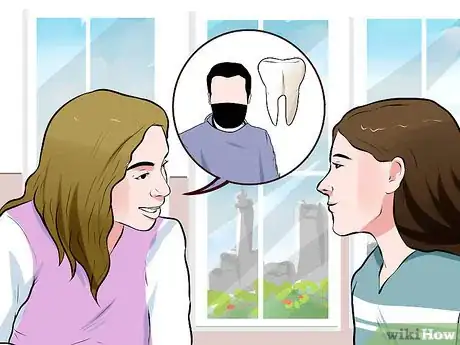

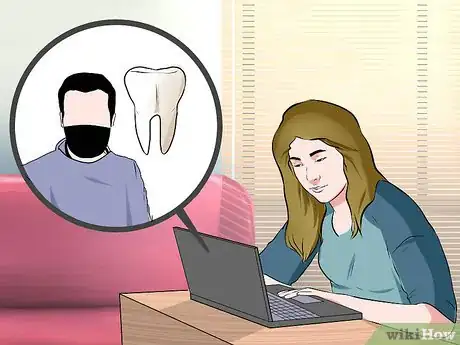







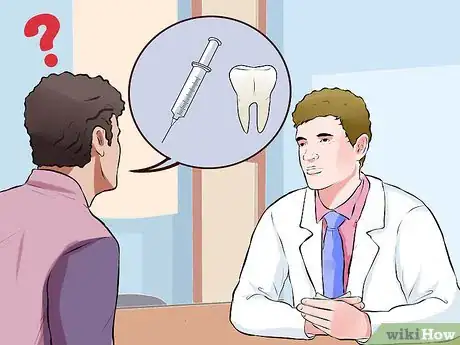

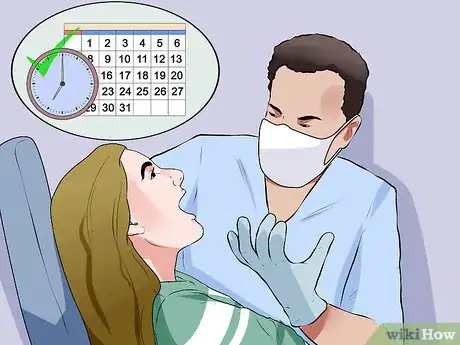



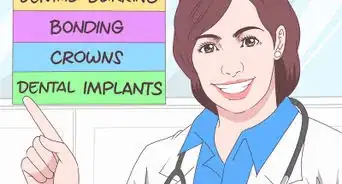
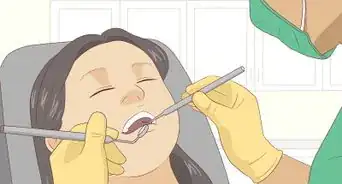








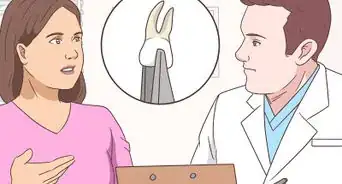









































Medical Disclaimer
The content of this article is not intended to be a substitute for professional medical advice, examination, diagnosis, or treatment. You should always contact your doctor or other qualified healthcare professional before starting, changing, or stopping any kind of health treatment.
Read More...